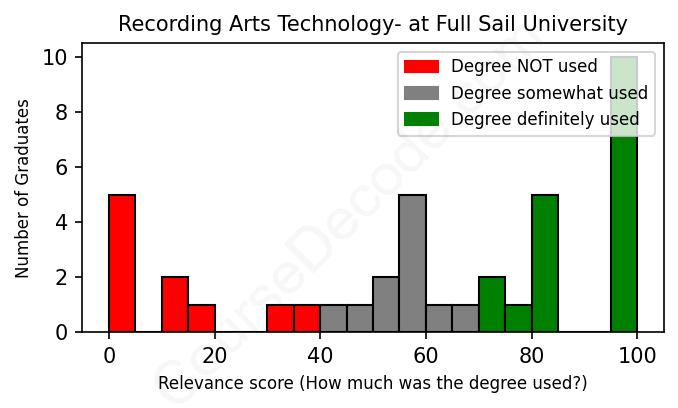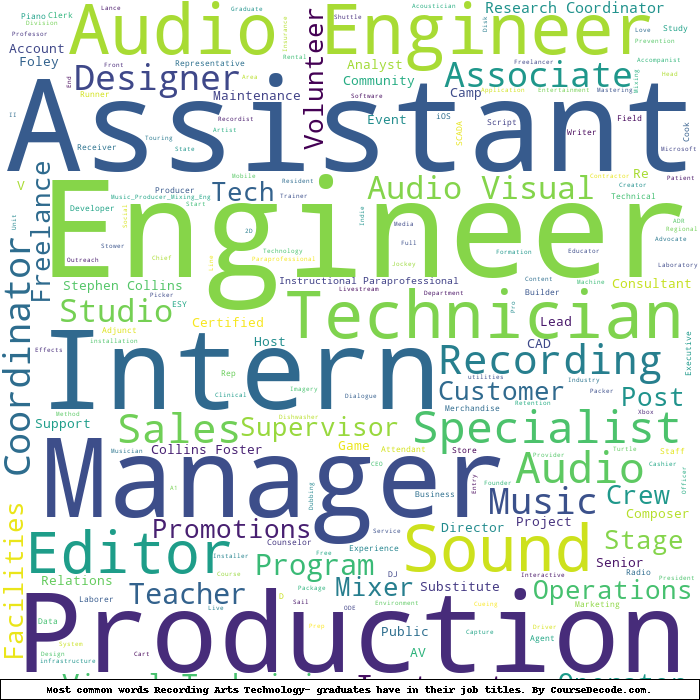
First, some facts. Of the Recording Arts Technology- graduates from Full Sail University we've analyzed , here's how many have used (or NOT used) their degree in their career:

These are estimates based on AI analysis of 39 LinkedIn profiles (see below).
The verdict? Below average. Overall, with an average relevance score of 60%, Recording Arts Technology- graduates from Full Sail University have a lower likelihood (-7%) of finding work in this field compared to the average graduate across all fields:
And for comparison, here's the chart for all profiles we've looked at across all degrees.
Also, after graduating, only 10% of these graduates have pursued further education other than another Bachelor's degree (such as a Masters degree or other), compared to the average across all profiles of 35%. This suggests a Bachelors degree is enough for most Recording Arts Technology- graduates, and it's normal to look for work straight after graduation.
See the details:
|
Relevance score: 43% We think this person has gone into a career only somewhat relevant to their degree. We think this person has gone into a career only somewhat relevant to their degree.
DEGREE INFOGraduated in 2012 from Full Sail University with a Bachelor of Science - BS in Recording Arts Technology-. No other secondary education since. JOB HISTORY SINCE GRADUATIONAssistant Recording Engineer Setai Studio Jun 2012 - Jan 2014 Graphic Designer Volunteer  Potential Church Dec 2016 - Dec 2017 Audio Technician  Ground Control Professional Audio Oct 2015 - Feb 2018 Audio Visual Technician/Interaction Designer  Navalimpianti USA Feb 2018 - Jan 2019 OSP/ISP Engineer CAD Operator  Draftpros, Inc. Jan 2019 - Feb 2020 CAD Technician  TechnoGroup Feb 2020 - Feb 2022 Senior CAD Designer  TechnoGroup Jan 2022 - Apr 2024 Architectural Designer  Paragon Systems Integration Apr 2024 - Present ABOUTI'm a seasoned design and integration professional, specializing in Audio Visual (AV) systems, design engineer and Computer-Aided Design (CAD). In my current role as a Senior CAD Designer, I have the privilege of contributing to solutions for Broadcast, AV, and Entertainment systems. My skills in CAD(2D/3D), Audio Visual System Design, and AVoIP Design enable me to assist in the engineering process to deliver high end systems to world-renowned clients. |
The top 10 most common jobs done by the graduates we've analyzed (ranked most common to least) are:
Based on the LinkedIn profiles analyzed, it seems like graduates from Full Sail University's Recording Arts Technology program have ended up in a variety of jobs, with many closely tied to their field of study. Among the most common roles are Audio Engineers, Freelancers, and positions like A/V Technicians, which directly leverage skills in audio and sound production. The prevalence of roles such as Music Producers and various engineering positions indicates that a solid chunk of graduates successfully finds opportunities that fully utilize their specialized training. Plus, many have moved up to more managerial positions, like Technical Supervisors or CEOs at entertainment companies, showcasing how this degree can lead to significant career advancement.
However, it's apparent that not all career trajectories stay directly aligned with Recording Arts Technology. Many graduates have found themselves in roles that, while sometimes related (like sales positions at tech companies), do not require the technical skills or knowledge gained from their degree. Jobs in customer service, retail, or even unrelated industries seem to be quite common, highlighting a diversification of paths that might not directly apply the creative and technical expertise taught in their program. In summary, while there are definitely promising careers within the industry, a sizable number of graduates are taking on roles that are only loosely connected to their training, which can be a bit of a mixed bag depending on the individual's career goals and adaptability in the job market.
Here is a visual representation of the most common words in job titles for Recording Arts Technology- graduates (this is across all Recording Arts Technology- graduates we've analyzed, not just those who went to Full Sail University):

So, if you're looking at what people who've studied Recording Arts Technology at Full Sail University typically end up doing, there's quite a mix. When they first graduate, a lot of them jump right into jobs that might not scream "recording arts," like sales positions or AV technician roles. This makes sense because right out of school, many are just trying to get their foot in the door and start making a living. For instance, several graduates took on roles in sales or event tech, which might not be directly related to audio engineering but still build valuable skills that help in the industry later on.
Flash forward five or ten years, and many of these grads appear to carve out more relevant careers in audio engineering, music production, and other technical roles. You can see folks becoming audio engineers for music groups, working in post-production for films, or running their own studios. However, it's not all sunshine and rainbows; there's a decent number who've found themselves in unrelated fields or jobs that aren’t using their recording arts expertise. While some graduates have clearly thrived and are doing pretty well in the music and audio industries, others have had to pivot quite a bit, sometimes settling for positions that don’t leverage their hard-earned skills. Overall, it’s a mixed bag, but with determination and a bit of luck, there are definitely pathways to rewarding careers in the sound and recording fields!
Honestly, getting a Bachelor’s degree in Recording Arts Technology at Full Sail University can be pretty intense, like a mix of creative fun and a good bit of brain work. You'll dive into all sorts of technical stuff, like audio engineering and studio production, which can be challenging if you’re not super comfortable with tech. Plus, the program moves fast since it’s a condensed format, so keeping up with assignments and projects can feel overwhelming at times. But if you've got a passion for music and sound and are willing to put in the effort, it can also be really rewarding and not overly hard—it just depends on how much you're into it!
Most commonly, in the LinkedIn profiles we've looked at, it takes people 2 years to finish a Bachelor degree in Recording Arts Technology-.
So, looking at the career paths of these Full Sail University grads, it seems like they've had a mix of financial success. Some have landed solid roles like Pro Audio Department Manager and Regional Operations Manager, which likely pay pretty well, especially in the audio and tech industries. Others are doing freelance work or entry-level positions, which might not bring in the big bucks initially. For example, a lot of them started as interns or sales associates before working their way up, and while that's totally normal, it means their early salaries might not have been that great. Overall, it looks like some of them are doing okay, especially those who climbed the ladder in audio engineering or management roles, but others might still be searching for that sweet spot in their careers. It's all about how you navigate and make your own opportunities!
Here is a visual representation of the most common words seen in the "about" section of LinkedIn profiles who have a Bachelor degree in Recording Arts Technology- (this is across all Recording Arts Technology- graduates we've analyzed, not just those who went to Full Sail University). This may or may not be useful:

Here are all colleges offering a Bachelor degree in Recording Arts Technology- (ordered by the average relevance score of their Recording Arts Technology- graduates, best to worst) where we have analyzed at least 10 of their graduates:
| College | Score | Count |
|---|---|---|
 Full Sail University Full Sail University
|
60 | 39 |